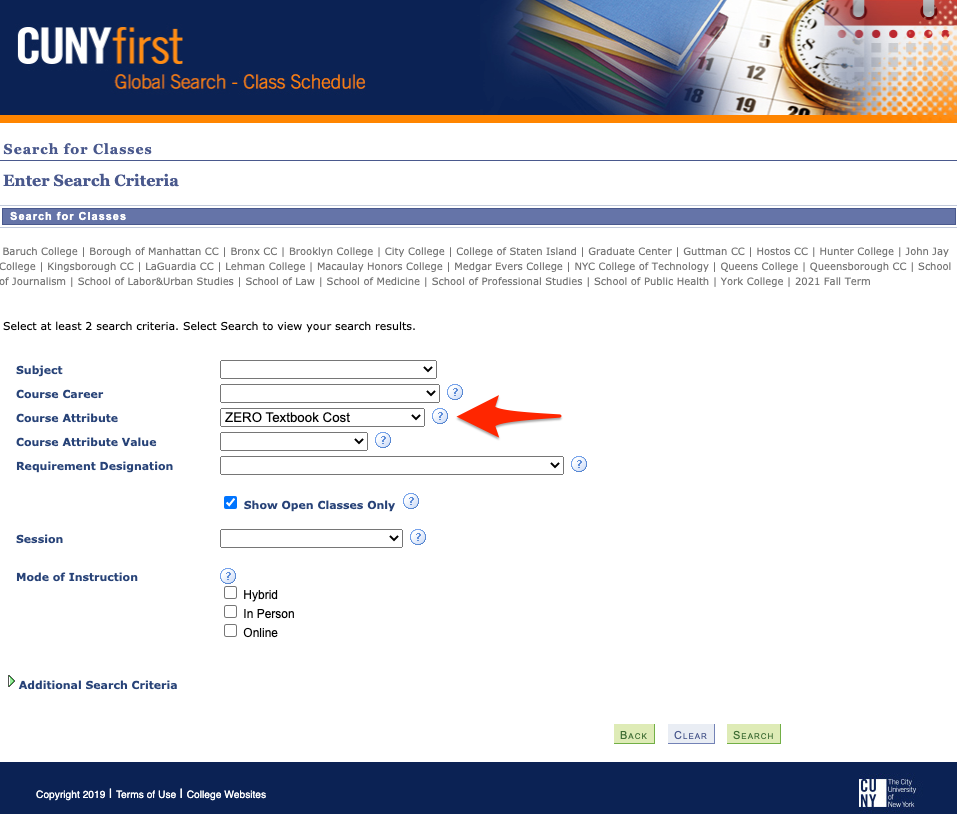- Center for Innovative Teaching and Learning
- About
- Task Forces
- Course Materials Affordability
- Zero Textbook Costs
Zero Textbook Costs
According to SPARC, a global coalition for open initiatives, Open Educational Resources (OER) are defined as,
“teaching, learning, and research resources that are free of cost and access barriers, and which also carry legal permission for open use.”
OER materials are not simply free textbooks—they encompass materials beyond the traditional textbook and must carry legal permissions for use and adaptation to truly be considered open. These materials are becoming increasingly available and have gained popularity among instructors in recent years are the cost of textbooks has made education inaccessible for many and has impacted the grades of many more.
A recent study showed that 2/3 of students surveyed did not purchase their assigned course material due to cost (U.S. PIRG, 2021). OER and related efforts for increasing the availability and use of no- or low-cost materials have been on the rise to address these issues.
NIU Libraries and the Center for Innovative Teaching and Learning (CITL) have partnered to progress efforts to address course material affordability. The following information describes efforts at other campuses.
Several states, including California, Oregon, Texas, and Washington have legislation requiring educational institutions to label courses that use no-cost materials and/or OER in their course schedules and registration systems (Lieberman, 2017). Some institutions offer “z-degree” programs and “z-courses,” that have no course material costs due to the use of free resources and/or OER.
For case studies, resources, and best practices on labeling no- low- materials courses, see:
- Marking Open and Affordable Courses: Best Practices and Case Studies
- Texas Toolkit for OER Course Markings (a living guide)
Lieberman, M. (2017, December 6). OER and Affordable-Textbook Labeling Gains Ground. Inside Higher Ed. https://www.insidehighered.com/digital-learning/article/2017/12/06/states-mandate-oer-and-affordable-textbook-labeling-challenges
The City University of New York course search is one example of a PeopleSoft student information system that incorporates a zero textbook cost course attribute for identifying and searching for courses with zero textbook costs.

- HB2928: Creates a pilot program for a 4-year degree pathway based on texts that served as the core foundational basis for western civilization and the Enlightenment. Provides that under the program, one public high school, one public community college, and one public university in this State shall be chosen to develop a competency-based baccalaureate degree program for a Fundamental Issues and Texts Humanities Degree. Contains provisions concerning a program director, the curriculum, open educational resources adoption incentives, reporting, and rulemaking. Passed in House (2021-04-22). Last Senate Actions: Referred to Assignments (2021-04-23); Alternate Chief Sponsor Changed to Sen. John F. Curran and Sen. Bill Cunningham Added as Alternate Chief Co-Sponsor (2021-04-29).
- SB0101/HB0332: Amends the Board of Higher Education Act. Provides that each public institution of higher education shall study and issue a report on the cost-saving methods and practices utilized by the public institution for improving students’ timely access to required course materials and the affordability of required course materials. Last Action: After passing in the General Assembly, the governor approved the bill and it became Public Act 102-0122 (2021-07-23)
SPARC. (2021, October 27). OER Policy State-by-State. https://sparcopen.org/our-work/state-policy-tracking/
- Course marking in their course schedule for low cost/no cost textbook courses ($25 or less)
- 25+ courses with no or low designation
- PSYC alone offers 50 sections of OER courses
- Z-degree is in the planning stages
- Course markings for classes with textbook costs below $50
University of Illinois Systen/CARLI Awarded $1 Million Open Textbook Pilot Grant
- The grant will fund Illinois SCOERs (Support for Creation of Open Educational Resources), a program that will provide access to open textbooks and personalized learning tools for entry-level courses in high-demand health care and human development career paths.
Bliss, T.J. (2015). Z as in zero: Increasing college access and success through zero-textbook-cost degrees. The William and Flora Hewlett Foundation. https://hewlett.org/z-as-in-zero-increasing-college-access-and-success-through-zero-textbook-cost-degrees/
Community College Consortium for Open Educational Resources. CCCOER: The Zero Textbook Degree
Finding and Accessing Content for Courses: Free, Open, and Affordable Resources. University Libraries, NIU